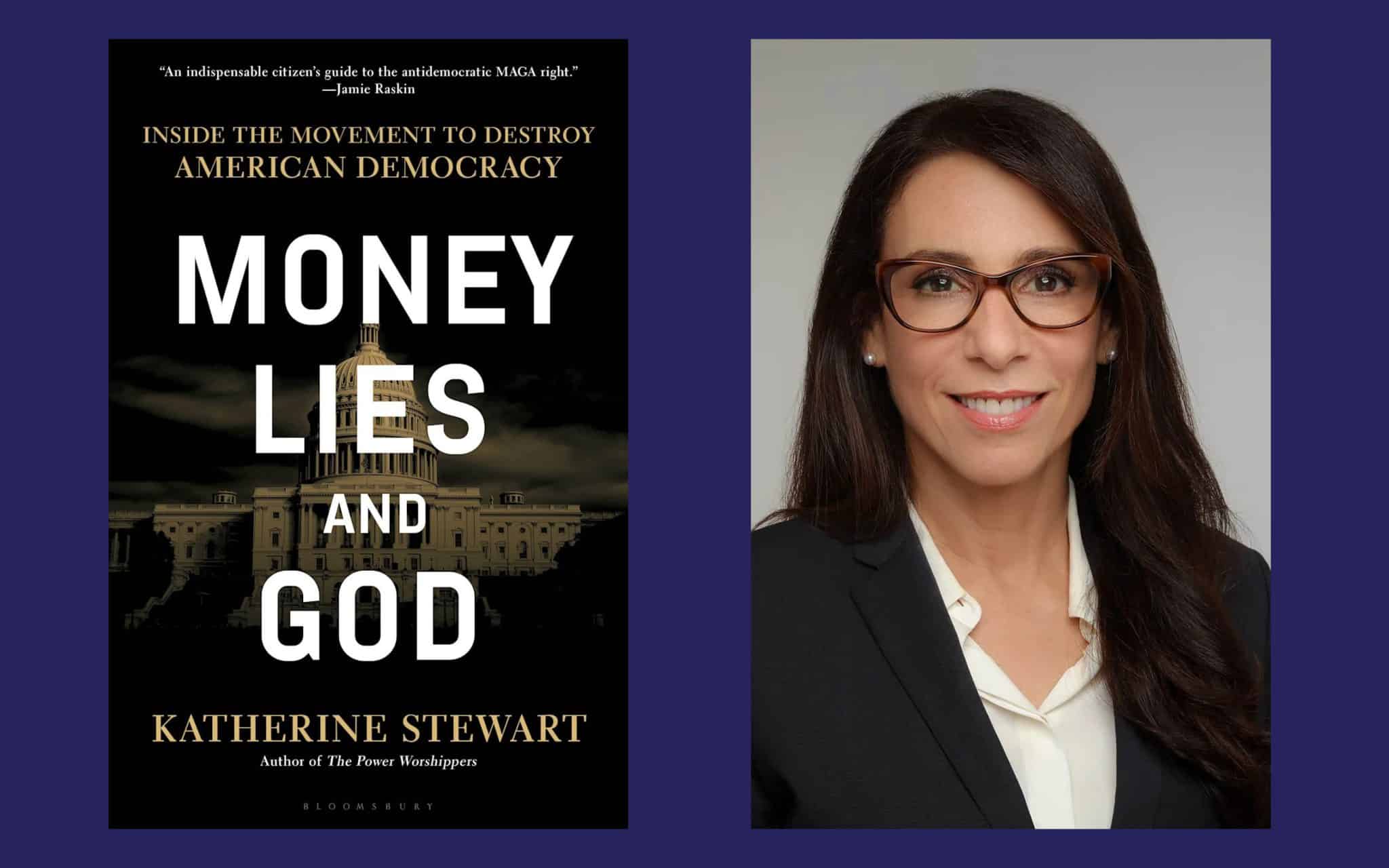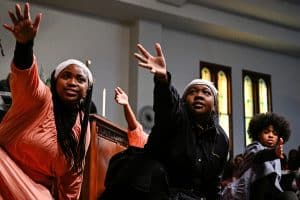Katherine Stewart is the author of The Power Worshippers: Inside the Dangerous Rise of Religious Nationalism, the award-winning book upon which the documentary feature, God & Country, produced by Rob Reiner and Michele Reiner, is based. She has covered the intersection of faith and politics for over 15 years; her work appears in the New York Times, The Washington Post, the New Republic, the Guardian, and Religion News Service and she has been featured on broadcast media outlets such as MSNBC, CNN, and NPR. Her 2012 book, The Good News Club, covered the religious right’s effort to infiltrate and undermine public education.
On Feb. 18th Stewart’s explosive follow-up to her 2020 book The Power Worshippers will be published. MONEY, LIES, AND GOD: Inside the Movement to Destroy American Democracy “exposes the inner workings of the ‘engine of unreason’ roiling American culture and politics, but aims at a bigger and more challenging target: how did we get to the point where there is an organized political movement within the United States that is working to destroy American Democracy? Furthermore, why have so many Americans turned against democracy?
Stewart takes readers to conferences of conspiracy-mongers, backroom strategy gatherings, and services at extremist houses of worship, and profiles the people who want to tear it all down. She introduces us to reactionary Catholic activists, atheist billionaires, pseudo-Platonist intellectuals, self-appointed apostles of Jesus, disciples of Ayn Rand, women-hating opponents of ‘the gynocracy,’ pronatalists preoccupied with the dearth of white babies, Covid truthers, militia members masquerading as “concerned moms” and battalions of spirit warriors who appear to be inventing a new style of religion even as they set about attacking democracy at its foundations.”
Katherine joins us today to talk about her new book and the role Christian nationalism and the Christian right play in this broader, and ascendent authoritarian and fascist movement that has democracy in its crosshairs – both in the U.S. and abroad.
Listen on Apple, Spotify, Podbean and iheart
TRANSCRIPT
So you first started reporting about the Christian right and the Christian nationalist movement back in 2009 when the Good News Club, a Christian evangelical Bible study group, which is part of a national campaign, came to your kids’ public school. That led you to write The Good News Club, The Christian Right Stealth Assault on America’s Children, published in 2012. Then you followed that up in 2020 with The Power Worshippers: Inside the Dangerous Rise of Religious Nationalism. Now your newest book comes out, Money, Lies, and God: Inside the Movement to Destroy American Democracy, which among its topics explores the role Christian nationalism and the Christian right play in this broader and ascendant authoritarian and fascist movement that has democracy in its crosshairs. Before we dive into Money Lies in God, can you talk a little bit about how the anti-democratic Christian right movement has evolved and grown over the last 15 years.
Absolutely. The movement has really changed in so many ways. It has broadened its base of donors. It has substantially increased its power. It has made inroads among new populations. It’s more overt, frankly, than it was when I started doing this research – I think it’s now 16 years ago. It’s now more overt in calling for an end to pluralistic democracy. Movement leaders used to have to hide their belief that only Christians of a certain reactionary type or people who are members of certain approved religions should dominate the key features of government and society. They used to hide their sort of, I would say, theonomic aims, this idea that our laws should be based on their preferred interpretation of the Bible. But now they’re pretty open about it. You know, the movement’s advanced in so many other fronts that I describe in Money Lies in God. And we can get to some of those later in this conversation.
For instance, we can talk about the war on public education. But I think frankly the most pernicious way in which the movement has shifted is the mainstreaming of lies and bad faith arguments. members of the movement have convinced themselves that any means, any means at all justifies the end when it comes to achieving godly rule. So they’ve really been funding and working with these massive disinformation and propaganda operations
I talk about Reawaken America and Money, Lies, and God. That didn’t exist 16 years ago. That was a sort of post pandemic or pandemic era invention, sort of traveling pro-maga conspiracist road show. But there’s so many other different kinds of disinformation operations that are drawing crowds and eyeballs and the sort of messaging of paranoia and fear is amplified through social media platforms and programming.
Now, finally, I want to say the movement is shifting in certain ways because religion is shifting in America, as it always has. Religion has never been static in this country. We have a unique in that … because of the separation, constitutional principle of church-state separation, we have a kind of free market of religions in a way, you know, instead of having a sort of state sanction form of religion.
Today, the movement has veered pretty far into, I would say, it’s drawing new energy from charismatic, a sector of the Pentecostal and charismatic movements, including the New Apostolic Reformation, but not limited to them, of course. And that has resulted in a mainstreaming of outright demonization of their political opponents in right-wing political circles. So for instance, this type of religion sees the spiritual battles playing out here and now in the political theater directly. And they say that, you know, God’s hand is on Donald Trump’s shoulder and anyone who goes against Trump is going against God’s will. So they must be under the control of Satan. You hear that kind of very violent, I would say, de-othering rhetoric. And that basically provides a permission structure for forms of political corruption, political violence.
Yes, and just to be clear, this is literal demonization. This isn’t just metaphorical. They’re actually accusing their opponents of being demons.
It’s really sad, because it’s so cruel and it’s of course patently untrue. We all saw what happened on January 6th. It was a disgraceful attack on our Capital. There is nothing more unpatriotic about that. And yet movement leaders through their
decided to get behind this president who was trying to overthrow an election, doing something that is as traitorous as can be. And they sort of amplify those lines, those lies. And I think some of them must have known that they were untrue. Some of them actually admitted or seemed to waffle for a while. This world is so much of an echo chamber and they’ve almost embraced this postmodern idea that if you just keep repeating an untruth enough times then…and if it has power, then it becomes the truth.
Sadly, that’s working. So when and why did you decide to write Money Lies in God after your first two books?
Well, I saw that the movement was shifting. I think a lot of this emerged pretty organically from my own reporting. So like when you go, for instance, into a gathering of pastors in Virginia and you hear these kinds of lies being mainstreamed and repeated over and over again, and this is a very kind of diverse gathering. And then all of a sudden you see that it’s being funded by a billionaire in California. You just think, well, this is something that’s really important, I need to continue to write about this. So there were so many different kinds of scenes like that that I got into. And I started to really understand that the Funders, there were different categories, I would say, of actors within this movement. And I felt like some of them really hadn’t received the attention that they needed. speak about, identify them more clearly and speak about them in greater depth in Money, Lies, and God.
Can you just talk a little bit about them, these five categories?
Yeah, great. I mean, to set that up, I want to briefly, very briefly talk about the title because it will help us understand these different categories. So I titled the book Money, Lies, and God because first, money is a huge part of the story, meaning that huge concentrations of wealth have destabilized our political system. Second lies or conscious disinformation is another feature of the movement. talked about that. And number three, God, because the most important ideological framework for the largest part of this movement is Christian nationalism. So first, let’s talk about those categories. In Money, Lies, and God, I pay very close attention to the money people, who I call the Funders. They are the beneficiaries of the massive concentrations of wealth over the past five decades. They’re investing their fortunes, or at least a portion of their fortunes, in anti-democratic projects.
So I’m thinking about people like the Koch Brothers, or Barre Seid, or the Wilkes Brothers, Tim Dunn, members of the DeVos Prince family, Juggernaut. The funders here, the point is they’re not any one type. Religiously, frankly, they’re all over the place. are Catholic, some are evangelical or Protestant. Some are Jewish, others are atheistic. But they all seem to agree on one thing, which is in order for them to get the tax benefits that they want, the policies that will justify their wealth and increase their fortunes, they’re already enormous fortunes, the deregulation that they want, but also the sweetheart deals, the privileged contracts, they need to crush liberals or what they call the administrative state. We’re starting to hear a lot of references to the so-called administrative state from the incoming administration. That’s the Funders.
I also shine a spotlight on a group of intellectuals I call the Thinkers. Many of them are affiliated with a movement called the New Right. And many of them are frankly not quite what you’d call Christian nationalists. Some are frankly quite nihilistic. Some draw inspiration from political theorists like Carl Schmitt. He’s a Nazi political theorist, I kid you not. But they seem more driven in a way by campus politics or political conflicts and like for them they really want power.
And they critique liberal elites, but they really want themselves to be a new elite. They want to establish a new elite. So they’ve played a critical role in bringing funders together with the Foot Soldiers of the Christian nationalist movement. And, who are the foot soldiers? Well, Christian nationalism is, you know, arguably, I would say the single most important piece of the anti-democratic reaction. And a lot of those local activists that it motivates, I refer to as foot soldiers.
And many of them too, they might not identify as Christian nationalist. And when they get involved, sometimes they’re motivated by issues like abortion or the defense of the family or whatever, parents’ rights and stuff. They’re not arguing for major changes necessarily in the way our government is run, but with their actions, they’re lending support to a Christian nationalist agenda. And then there’s of course a small cadre of leaders that you can, they’re not foot soldiers, they’re like, I call them the Sergeants and Power Players, and they’re the ones who are often driving the agenda. The sergeants are sort of political pastors who are sort of motivating their flocks to turn out to vote for candidates that the movement favors, spreading some of these lies and disinformation. The power players are like the big powerful religious right leaders, Christian nationalist leaders of the Christian nationalist movement.
A lot of the research and writing, you know, around the Christian right often focuses on evangelicals or charismatic Christians. But as your reporting bears out, the Catholic right or so-called trad Catholics also play a substantial role. Could you speak a little bit about that?
There are of course left-wing Catholics, but it’s the right-wing Catholics who have influence in the anti-democratic reaction. So the second chapter of Money, Lies, and God focuses on the fact that the church and laity are deeply divided. Half or more of the Catholic population is, I would say, liberal in its outlook and in its voting, but it’s the hard right folks who are dominant in the intellectual space and the political influence of the anti-democratic reaction. So there are a number of Catholic bishops in America and leaders who have staked out a very pro-MAGA, very demagogic, hardline position. While they don’t really represent the majority of Catholics, they’re in a way the dominant political influence coming out of the Catholic world right now. They’re behind a huge part of the work of the New Right.
The fundamental goal is to create a national network of publicly financed religious schools that explicitly favor a particular conservative form of Christianity.
The other sort of factor I describe in the book related to this is the rise of a sort of sector of the funders who are themselves Catholic. You know, they’ve been, I think they’re driven by two factors, two major developments in the Catholic church, both in the same direction. So one is that the authority of the church has gone down as a result of their role in defending, so the child abuse scandals that are still being uncovered all over the world, these sort of predatory priests who were abusing children and that sort of reduced a lot of faith in the Catholic Church. And at the same time, sort of among a lot of sectors of the laity, and at the same time, the wealth of the richest people in America has frankly skyrocketed over the last five decades. So now we have a collection of Catholic, multi-multi-millionaires and billionaires who feel they have been called to direct the affairs of the church as well as the flock.
So they’re creating these organizations that are outside the church. They’re not part of the church, but they’re Catholic organizations and they’re coming back in to influence church doctrine. And not surprisingly, a lot of these very rich funders are on the whole libertarian in economic policy. But when it comes to social issues, they’re hardline conservatives. They really wanna use the power of government to impose their values on others while at the same time they wanna serve, liberate corporations from having to pay their fair share of taxes or abide by restrictions on polluting or they want to actually be protected from certain kinds of market forces. They’re sort of like the other funders and that they’re after policies that will privilege them. And yet they also want to sort of impose this sort of what they see as an agenda of morality on the little people.
Let’s circle back to the war on public education, which you had mentioned. This plays a big part in this movement’s larger war on democracy. Attacks on public ed aren’t new. Since the inception of compulsory public education, there’s been a pushback immediately from America’s elite business class, angry over its loss of part of its workforce, namely child labor, to the KKK, to right-wing lawmakers in Tennessee, barring any instruction in science class that denies the story of divine creation of man taught in the Bible, or otherwise just kind of banning Darwinism. But can you talk a little bit about what this looks like today and how privatizers and proselytizers, as you describe in your book, are more effectively working together to destroy public education as we know it?
Yes, thanks. This is a topic that’s really dear to my heart because I started researching this topic 16 years ago and back then it was really clear that the movement was deeply hostile to the institution of public education. Jerry Falwell laid out the agenda in 1979. He said, I hope to see the day when there are no more public schools, churches will have taken them over, Christians will be running them, but … you know, the religious right activists, the proselytizers, you know, and the privatizers with whom they work often hand in hand tended to be at that time more discreet about their aims. Only a few, frankly, crazies were out there admitting that the end game was to starve the beast of public education and redirect the flow of taxpayer cash to private and religious and ideologically right-wing schools. But now, I mean, one thing that’s really changed is they’re quite upfront about it.
So the fundamental goal is to create a national network of publicly financed religious schools that explicitly favor a particular conservative form of Christianity. So superficially, it looks like they’re trying to achieve the same by forcing their initiatives and programming into the schools. That’s, you know, of course the motive behind the 10 Commandments law that make it, you you have to have a 10 Commandments displayed in every public school classroom. Or the law in Texas recently that we saw that offers to pay schools to teach elementary age children a sectarian Christian agenda, or the Louisiana and Oklahoma rules imposing Bible in schools. So what they’re doing through these initiatives is that in a diverse public school setting, these initiatives are incredibly divisive. They cause a lot of chaos in the school districts because some number of parents are gonna feel frankly, like it infringes on their religious liberty, like it makes them feel unwelcome and it sort of targets their children as others are different. So these initiatives undermine public education. They foster mistrust in public schools in order to pave the way for privatization. So that division and conflict that they promote, it’s not an unintended consequence of their activity. It’s frankly the point. And the desired end is a system where taxpayers either directly fund religious schools – we’re seeing this through the sort of case that’s now working its way through the courts in Oklahoma with a fully, you know, taxpayer funded religious charter, St. Isidore Academy, or they also want to supply parents with vouchers and then parents use those vouchers to funnel money, taxpayer money into religious schools. I don’t know, speaking rather cynically, it’s kind of a twofer, right? Because this promises to be very profitable for the religiously motivated entrepreneurs who want to get money for their own schools. And at the same time, it’s really intended to help build a constituency for Christian nationalist politics. You get those kids indoctrinated the right way, and pretty soon they’re gonna vote for us.
You had mentioned earlier, Carl Schmitt and him being a Nazi. And this makes me think of the Claremont Institute, which, you know, I had come across a while back because they were actually publishing the writings of a Nazi, his name goes by the name Raw Egg Nationalist, who actually has books published with a local Pennsylvania Nazi publishing house.
READ: Pennsylvania-based White Nationalist Publishing House Uses Amazon to Help Fund Its Hate
Antelope Hill, I know, and I wrote about him in Money, Lies, and God. I mean, he’s pretty extreme. He thinks maybe he literally said this, maybe men and women shouldn’t work together in the same spaces. Like, huh, we’re gonna have all male hospitals and all female hospitals.
Yeah, this is, it’s amazing that it’s 2025.
Do you have male universities and female universities?
So, talk a little bit about who the Claremont Institute or what it is and how they first came across your radar and why they’re important to this broader story that you’re telling.
Absolutely. You know, the Claremont Institute is a think tank that came together in the late 1970s. Some graduate students were inspired by the political philosophy professor, Harry Jaffa. You know, back then, this is an organization, a think tank that saw its mission as bolstering democracy. They wanted to bolster America’s founding principles. So it was always conservative, but it was like normal conservative, like real conservative.
But it was also intellectually somewhat diverse. Jaffa himself had some liberal views and some more sort of moderate views as well. But it has over time become more and more reactionary and extreme. So it’s a think tank, it runs a couple of journals, it has a fellowship program that brings in a lot of people and it tries to insert itself in the political process. And it has had enormous success today.
So here are three things, three key things we need to know about them. The first is that they’re very powerful. They now have a very deep network that’s connected with Republican politics, including Trump. A number of his cabinet picks are affiliated with Claremont Institute. So it’s not some fringy group hanging out like on the beaches of California. They’re taking up power in Washington. So that’s the first point. I would say in terms of their basic ideas, the most important one is what
Nazi theorist, Carl Schmitt, would call a state of emergency. So in their view, America is so broken and defective and certain to collapse because of what they call a woke elite, … the fact that somebody or DEI or whatever, somebody got a, you know, a job that they think that she didn’t deserve or whatever. And that’s like the worst problem facing our country. That means we’re on the brink of collapse. And so any intervention is justified. We need to set aside any laws, any institutions that get in the way of their takeover. They think that the source of the crisis is this sort of woke elite. They say it’s captured the so-called administrative state. I guess that would be, you know, all the functions of government, the FDA, air traffic controllers, whatever. And those people who obviously don’t look like the men of Claremont, you know, not white men, need to be rooted out at any cost.
I mean, it’s no surprise that there’s so much sort of rank misogyny that comes out of this movement. Like Raw Egg Nationalist who’s been published in some of their journals repeatedly literally said maybe men and women shouldn’t work in the same spaces and was sort of others have sort of said much worse, which and you know, I have a whole section on that in Money, Lies, and God. You know, I think that that sort of sense of emergency because America has become too liberal or whatever.
Because certain groups that were once more subordinate, like women, now achieving some measure of equality, they see this as an absolute crisis. And I think that that’s the most important aspect of their political creed, because fascism and authoritarianism is always tied to the sense of crisis and the idea that somehow an elite of intellectuals or overly liberal people are to blame.
They sort of take this lesson associated with Leo Strauss, which is that you’ve got these two distinct groups of people. There’s the intellectual special cadre, them, the thinkers who are the new elite, and they speak to one another in language that they understand. They’re going to form this new conservative vanguard. On the other hand, you have the people, the supposedly virtuous people. Those are the real Americans. And it’s really okay to lie to them. They need to just be disinformed enough to be led to the right thinking supposedly, the policies that this virtuous elite wants. So yeah, it’s not a fringe group. A lot of their folks are involved in the incoming Trump administration, the cabinet.
Another part of your reporting, I think is very important to highlight, is the global nature of this movement. We think about the term Christian nationalism, and I think that might lead people to think this is just exclusive to the United States. But it actually goes, this movement, this reactionary right-wing authoritarian movement, goes beyond our borders. Can you talk a little bit about that and how your book reports on that?
Absolutely. You know, the title of my previous book, The Power Worshippers: Inside the Dangerous Rise of Religious Nationalism, I used the term religious nationalism really because I wanted to draw similarities with other forms of religious nationalism around the world. So when you have a leader like Vladimir Putin in Russia or Erdogan in Turkey or leaders in Iran, when you have like a leader who wants to consolidate a more authoritarian form of political power, and binds himself very tightly to very tightly to ultra conservative religious figures in his own countries in order to consolidate that power. What he’s doing is bubbly wrapping himself in sanctimony. It makes it more difficult for people to investigate their corruption, to look into the ways that they’re abusing their own people. You could see a lot of times that their countries are theocratic in a certain fake sense, that is, there are regimes that endorse a particular religion and attempt to impose that religion on society. But they’re more often best described as, I would say, cronyistic kleptocracies with very strong militaristic features and absolute suppression of free speech, no tolerance for or little tolerance for political opposition.
So the anti-democratic movement is not an American phenomenon only, MAGA is being exported today aggressively around the world, but at the same time, it’s drawing on resources and alliances from overseas. I would say some other nations have their versions, their own sort of parallel versions of a sort of authoritarian reaction. And these disparate parties and activists are increasingly finding ways to work together across borders. So I sort of wanted to explore this further in Money, Lies, and God, and that really comes into part of the third section.






